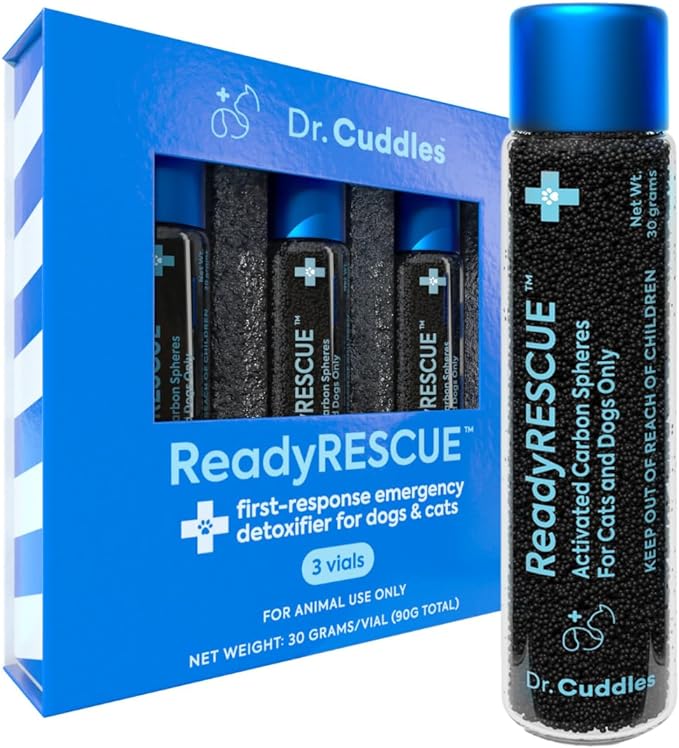We sure are head over paws for our pets, aren’t we? They are not just animals to us—they’re our family. Just as we would protect our human family members from potential harm, we should do the same for our pets. But here’s a bit of a ruff fact: Accidental pet poisoning happens more often than you think. The ASPCA Animal Poison Control Center (APCC, one of many pet poisoning resources) alone receives approximately 401,000 calls every year about potential poisonings (ASPCA, 2021). This statistic is a clear sign that having an at home pet detoxifier on hand isn’t just smart — it’s a must to quickly and efficiently detox your dog. Until now, this was not truly possible, but with the release of ReadyRESCUE, it now can be!

The Dangers of Delayed Treatment
Time is of the essence when it comes to pet poisoning and detoxing your pet — the faster it’s addressed, the better. Back in 2021, the APCC fielded about 401,000 calls (APCC, 2021). One report in 2015 reported that as many as 20% of the animals (for which pet owners provided follow up) did not survive or had to be euthanized due to the severity of their condition (Javma, 2015). These figures prove the critical importance of early intervention in cases of pet poisoning and pet detoxing.
Further compounding the issue, reaching an emergency veterinarian can take a considerable amount of time. A 2018 study showed that the average one-way travel time to the nearest veterinarian in the United States was approximately 19.4 minutes (JAVMA, 2018). Adding this travel time to the process of determining a toxic dose, coupled with the time spent in triage, check-in, and treatment at a veterinary hospital, the average time to treatment from realization of intoxication could range from 60 to 80 minutes. This delay provides a window for the toxin to be absorbed by the pet's body, making detoxification much more difficult. In fact, in humans, a one-hour delay in treatment via gastric lavage (where a stomach tube is placed down the throat and the stomach actively emptied and rinsed out) reduces the amount of toxin removed from the body from 70% to 15%- So time to treatment is crucial.
How to Detox Your Dog at Home: The Role of At Home Pet Detoxifier
An at-home pet detoxifier serves as the equivalent of a “fire extinguisher under the sink”, offering immediate detox treatment in cases of toxin ingestion, while the pet parent prepares to take the pet to the vet. Such a product could also provide crucial assistance while the pet owner determines whether the substance ingested was toxic or consumed in a quantity high enough to pose a danger. An effective detoxifier, such as an adsorbent (or toxin binder,) has been shown to reduce the amount of toxin absorbed into the bloodstream when administered after intoxication, thus lessening the amount of poison that needs to be eliminated from the body and limiting potential damage. In the case of acute intoxication, immediate administration of a home detoxifier could literally be a lifesaver.
Economic Considerations
Apart from the potential to save your pet's life, having an at home pet detoxifier could also significantly cut down on the costs associated with emergency veterinary care. The costs of treating pet toxicities can vary widely depending on the type of poisoning and the severity of the case. As of 2021, emergency vet visits, which could include tests, treatments, and hospitalization, could range from hundreds to thousands of dollars per visit (Pet Care RX, 2021). In this light, investing in an at-home method to detoxify your pet that could reduce the amount of toxin absorbed by the body could save your wallet as much as your pet.
Conclusion
Given the high number of pet poisoning cases, the associated mortality rate, the variable amount of time it takes to receive emergency veterinary care, and the cost of professional detoxification, it's clear that having an at home method to detox your dog or cat is an invaluable part of pet care. It's a relatively small investment that can greatly enhance your pet's chances of surviving accidental poisoning, potentially save you substantial amounts of money in emergency care costs, and most importantly, provide you with peace of mind.
Up until recently, a practical home detoxifier for pets was not available for pet owners. Today, Dr. Cuddles is happy to announce the arrival of ReadyRESCUE, an advanced activated carbon adsorbent that is 6 times more effective by volume than the activated charcoal used in veterinary hospitals today. In addition, it is clean (in contrast with current activated charcoals that are very messy) and easy to administer. ReadyRESCUE is the one pet care product that should be in every household. As Dr. Ben Brainard, emergency and critical care faculty at the University of Georgia Veterinary Medical Teaching Hospital puts it, “This product should be in every home with pets as a safe and effective initial treatment for home-based intoxications in dogs and cats.”
**Remember, though ReadyRESCUE provides essential initial aid in the event of pet poisoning, it is not a substitute for communicating with pet poison control and your veterinarian to determine if professional veterinary treatment is needed. Always reach out to your vet or a pet poison control center immediately if you suspect your pet has ingested something toxic.
If it is easier to purchase on Amazon, Click Here.
Sources:
- ASPCA. (2020). ASPCA Animal Poison Control Center Marks 40 Years of Helping Animals.
- APCC. (2018). Annual Report of the ASPCA Poison Control Center.
- Swirski, A. L., Pearl, D. L., Berke, O., & O'Sullivan, T. L. (2020). Companion animal exposures to potentially poisonous substances reported to a national poison control center in the United States in 2005 through 2014. Journal of the American Veterinary Medical Association, 257(5), 517-530.
- https://www.aspca.org/about-us/press-releases/aspca-animal-poison-contro...
- JAVMA. (2018). Access to Veterinary Care: Barriers, Current Practices, and Public Policy.
- Pet Care RX. (2021). How Much Does an Emergency Vet Visit Cost?
